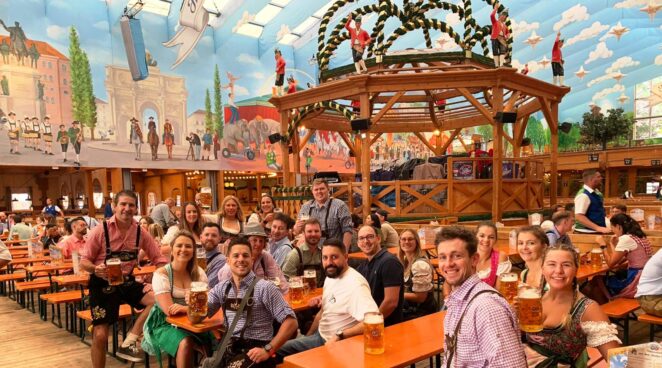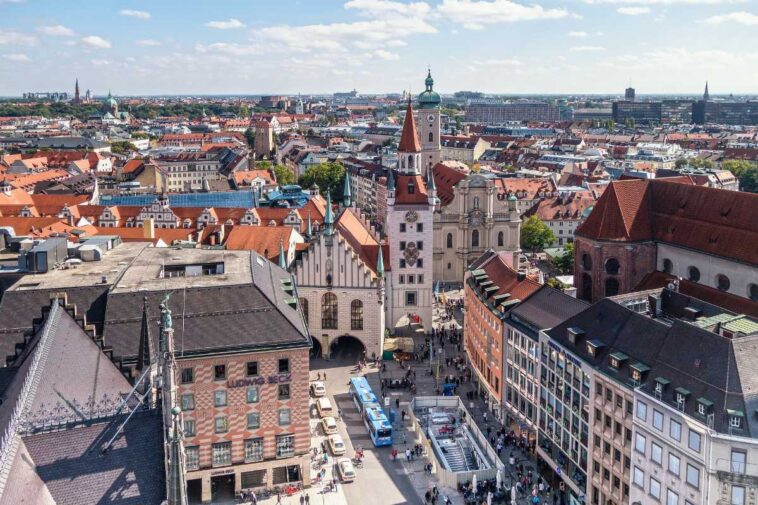Munich is more than just Bavaria’s capital—it’s a city that transforms with each passing season. Whether drawn to its snow-dusted winter charm, its world-renowned festivals, or its laid-back summer beer gardens, timing your visit right can unlock a completely different version of the city.
This guide highlights the best times to visit Munich depending on the kind of experience you’re after—be it culture, nightlife, nature, or holiday festivities.
Monthly Breakdown: What to Expect All Year

| Month | Weather | Key Events | Crowd Levels |
| January | Cold, snowy | Winter sales, skiing nearby | Low |
| February | Cold, clearer | Fasching (Carnival) celebrations | Low to medium |
| March | Warming up | Starkbierfest (Strong Beer Festival) | Medium |
| April | Unpredictable | Frühlingsfest, cherry blossoms | Medium |
| May | Pleasant, green | Outdoor cafes reopen, Auer Dult fair | Medium |
| June | Warm, sunny | Summer festivals, river surfing | High |
| July | Hot, lively | Tollwood Festival, nightlife peaks | High |
| August | Peak summer | Rooftop bars, city-wide leisure | High |
| September | Cooling, festive | Oktoberfest begins | Very High |
| October | Crisp, golden | Oktoberfest ends, cultural programs | High |
| November | Grey, quiet | Museum visits, café culture | Low |
| December | Cold, festive | Christmas markets, concerts | High |
Spring in Munich (March to May): Cultural Awakening
As winter melts away, Munich wakes up with a quiet, colorful confidence. The first warm days bring locals out of hibernation and parks slowly fill with picnickers and cyclists. Museums and galleries begin rolling out fresh exhibitions, and beer gardens cautiously reopen, depending on the weather.
- Weather: Average temperatures range from 5°C in March to about 17°C in May.
- Activities: Spring is ideal for museum-hopping, enjoying fewer crowds, and seeing cherry blossoms in the English Garden.
- Events: The Frühlingsfest (Spring Festival) in April is sometimes called the “little Oktoberfest” and features beer tents, carnival rides, and local fare—without the massive tourist crowds.
This season is perfect for those who enjoy culture and local ambiance without the chaos of summer tourism.
Summer (June to August): Outdoor Living and Longer Nights
Summertime in Munich is synonymous with open-air living. Locals flock to the Isar River banks, lakefronts, and urban green spaces. With daytime highs between 20°C and 30°C, the weather is ideal for strolling through historical districts or relaxing in the beer gardens that dot the city.
For those seeking premium leisure experiences, summer also lends itself well to bespoke outings. Some travelers opt to enhance their stay with tailored companionship and social refinement.
Reputable services like escort service München cater to discerning guests, providing elegant company for cultural events, business functions, or simply elevated evenings out in the city. These services are legal, discreet, and regulated, aligning with Munich’s broader culture of privacy and sophistication.
Top Reasons to Visit Munich in Summer:
- Open-air cinemas, riverside bars, and cultural festivals like Tollwood
- Surfing on the Eisbach wave in the English Garden
- Sunset views from Olympic Hill or rooftop terraces in Glockenbachviertel
- A more vibrant nightlife scene stretching from Kunstpark Ost to Maxvorstadt
If your ideal travel includes a blend of nature, city energy, and luxurious downtime, Munich in summer is a top-tier choice.
Fall (September to November): Festivals and Golden Foliage
Fall is when Munich shows its most iconic side to the world—thanks largely to Oktoberfest. This world-famous beer festival runs from late September to the first Sunday in October and draws millions from around the globe. But beyond the festivities, the season is rich in color, tradition, and harvest flavors.
- Oktoberfest: Held on the Theresienwiese fairgrounds, it offers 14 massive beer tents, traditional music, parades, and local cuisine. Accommodation prices and availability during this period can be a challenge, so booking early is essential.
- Weather: Temperatures drop from 20°C in early September to around 5°C in November.
- Autumn Appeal: Visit Nymphenburg Palace, stroll the tree-lined paths of the Englischer Garten, or take a short drive into the foothills of the Alps for dramatic seasonal color.
For travelers who appreciate tradition, cultural depth, and vivid natural scenes, autumn offers an unbeatable blend of experiences.
Winter (December to February): Festive Spirit and Alpine Access
Munich in winter is nothing short of atmospheric. Snow often blankets the rooftops by December, and the air is filled with the scent of roasted almonds, mulled wine, and cinnamon.
Why Winter Has Its Own Magic:
- Christmas Markets: The Christkindlmarkt at Marienplatz is iconic, but smaller ones in Schwabing or Haidhausen offer a more intimate feel.
- Winter sports: With the Alps only an hour away, day trips to ski resorts like Garmisch-Partenkirchen or Zugspitze are popular.
- Cozy culture: Warm up in historic cafes, browse art museums like the Alte Pinakothek, or enjoy concerts at the National Theatre.
Despite shorter daylight hours and cold temperatures (often between -5°C and 5°C), winter appeals to those in search of festive beauty, alpine adventure, and serene city life.
Special Events to Plan Around
Munich hosts unique events throughout the year that could enhance—or complicate—your travel plans:
- Oktoberfest (late September–early October): Book hotels months in advance.
- Tollwood Festival (June/July & December): A multicultural festival with music, art, and sustainability focus.
- Christkindlmarkt (late November–December 24): Munich’s signature Christmas market.
- Starkbierfest (March): A lesser-known local festival celebrating strong beer with traditional music and hearty food.
Each event reveals a different side of Munich’s identity, from its hearty traditions to its artistic leanings and global outlook.
Choosing the Right Time Based on Interests
To make trip planning easier, here’s a breakdown by interest:
- Art and Museums: Visit in spring or winter when indoor activities are most appealing and crowds are lighter.
- Nature and Parks: Summer and fall offer the best weather for outdoor exploration.
- Luxury and Nightlife: Late spring to early fall suits high-end dining, rooftop drinks, and premium social services.
- Cultural Immersion: September through December captures Munich’s most iconic traditions and festivals.
- Budget Travel: January, February, and November are off-peak months with lower hotel rates and fewer tourists.
Final Thoughts
Munich is a city that rewards repeat visits. Each season has its own identity, from the buzz of beer gardens under chestnut trees to the peaceful glow of snow-dusted markets. Timing your visit with your interests—whether food, art, festivals, or luxurious escapes—will ensure a more memorable stay.
Whether you’re drawn by Oktoberfest’s lively spirit, the quiet beauty of alpine winters, or simply wish to walk through cobbled streets soaking in Central European elegance, Munich offers a season for everyone.



